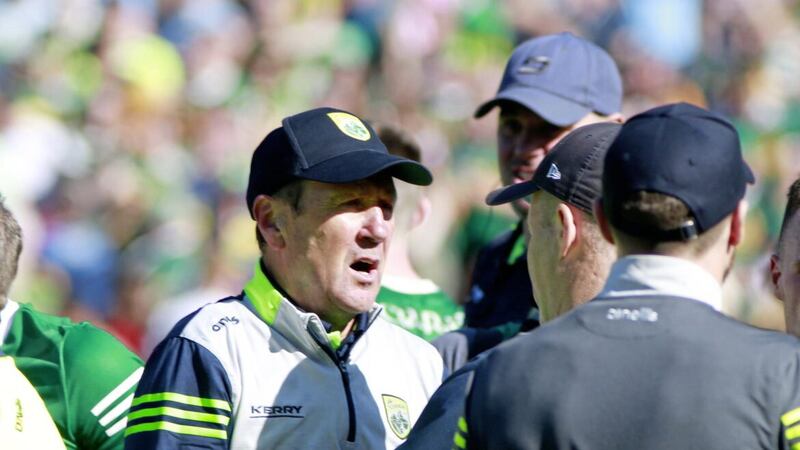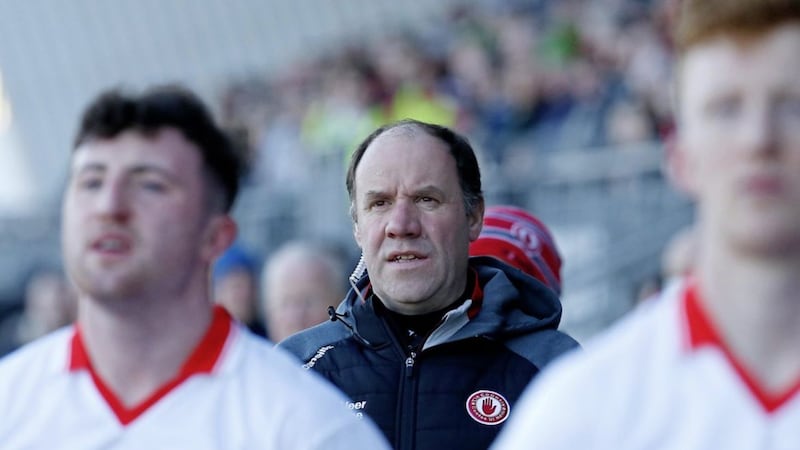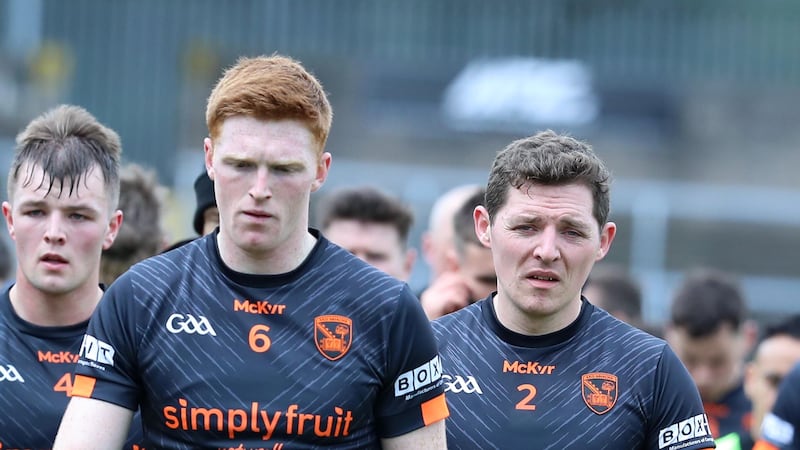KERRY’S All-Ireland final media day was a rare thing on the inter-county circuit this year – insofar as they staged one in the first place, and that it was one of the few worth attending.
In an in-depth interview with Jack O’Connor, the Kerry manager, appearing in tomorrow’s edition, he was talking to the print and broadcast media for roughly four hours in the Gleneagle Hotel, Killarney last week.
During that time, O’Connor did 20-plus interviews, a dozen of which were for either radio or television. In hindsight, some media outlets should have doubled up, if only to spare the Kerry manager’s larynx for training that week.
O’Connor says he was suitably drained afterwards.
Shane Ryan, Tadgh Morley, Mike Quirke and Diarmuid Murphy were also available for interview. The media event probably lasted longer than it should have but O’Connor knows the terrain better than anyone.
He comes from a different generation when players didn’t collectively run a mile from a tape-recorder.
They interacted with journalists, they told their back stories, made their families proud, and probably still have the faded newspaper cuttings stowed away in some cardboard box in the attic.
So the physical archives live on. They prompt emotions similar to when we open an old family photo album, full of scratchy, blurry Polaroids of our childhoods playing in the street or on holidays.
While most parts of the inter-county landscape are now firmly anti-media – it’s hard to reach any other conclusion – it was refreshing to hear O’Connor offering an alternative perspective, that your house won’t fall down when you talk to the press.
“We don’t take ourselves too seriously,” Jack said. “There are no trade secrets, really. What are you trying to hide? These players and those involved are intelligent people. They’re not going to say anything stupid.
“This isn’t about gritting your teeth and putting your life on hold for six months to try and win an All-Ireland. We’ve got to enjoy this as we go along. I think talking to people and expressing yourself is part of that.”
To extend O’Connor’s analogy, it would seem the vast majority of inter-county teams have been doing exactly that: gritting their teeth, putting their lives on hold and viewing the media with deep suspicion.
A lot of it smacks of collective insecurity. In an era where one-to-one interviews are on the verge of extinction and in danger of being replaced by anodyne social media sound-bites, a few things come to mind.
The great Tyrone and Armagh teams of the ‘Noughties’ were two of the most media-friendly and successful squads you’d encounter.
Many players from that era, who enjoyed speaking with the media, now occupy a whole host of paid punditry and columnist roles. More power to them too.
When players forfeit the media space afforded to them, opinion and profile pieces fill the void.
I remember Shane McNaughton, a former Antrim hurler now carving out for himself a successful acting career in America, saying he enjoyed the discipline of doing media interviews as they made him think and he also felt they prepared him when going for job interviews.
What we had this year was a GPA media ban that never properly recalibrated itself when ditching its ban as soon as the expenses stand-off was resolved. Confusion reigned as some didn't know whether the ban was still in place or not.
Granted, the turnaround times were tighter between games and therefore a can’t-do attitude prevailed when the GAA media came calling for access.
For instance, the Derry footballers came and went in a blink of an eye.
Reaching an All-Ireland semi-final was a staggering achievement for Rory Gallagher’s men, but the players headed back to their clubs without leaving a trace of themselves and how they got to this point in their young lives.
Who was Conor McCluskey? And Ethan Doherty? What was their back story?
Now, the media did have access to the Derry camp but it always seemed to be Chrissy McKaigue put forward for interview.
Fiercely articulate, affable and an independent thinker, Chrissy probably ran out of things to say to reporters at these painfully curtailed events.
Consequently, there was a disconnect between the media and players. Some teams lost, others won – but there was no empathy, no emotion expressed in the telling of their stories. Everyone moved on.
For the media, it was a desert between games. Boring in other words.
The Wimbledon tennis championships never had it so good in the local sports pages and air-time that should have been the preserve of the GAA.
The lack of access in 2022 has also had financial repercussions for the dwindling number of GAA freelancers who would happily sit in empty grounds and file reports of a school or college game for a pittance because they love the game more than the modest pay cheque itself.
In the not too distant future, this dying breed will probably disappear altogether – probably because of the price of diesel and failing to net the odd interview that will supplement their income - and we’ll all be relying on Twitter feeds that haven’t posted since 2016.
In the build-up to this month's All-Ireland semi-final between Dublin and Kerry, ex-Dub Bernard Brogan tweeted that GAA teams should be “compelled by the GAA to do media and promote the games… I haven’t heard a sausage about what will be an amazing game…”
Of course, Brogan was part of a Dublin team that rarely, if ever, interacted with the GAA media, unless it was a sponsored gig.
Last weekend on The Sunday Game, Donal Og Cusack bemoaned the lack of promotion of hurling from the print media and preferred an extended inter-county season.
The expressed basis of his research was having a cup of coffee in Ballsbridge, borrowing a newspaper to find that the first mention of the All-Ireland hurling final was on page 11 of the sports supplement.
Of course, it depends where you’re looking and where you’re not looking. You might have to extend yourself beyond a cursory glance of a Sunday newspaper that you didn’t pay for.
Perhaps it didn’t occur to the former Cork goalie that there is no meaningful access to the top hurling teams in the country, and yet the print and broadcast media still extend themselves to promote the games, largely without the central protagonists: the players.
So when people talk about extending the inter-county season, we’ll only see more desert and observed silence.
Roll on the club season. It can’t be any worse than what’s gone before.








